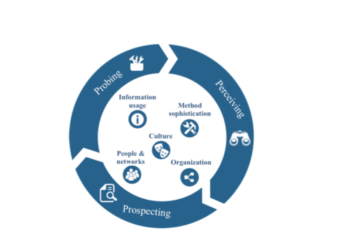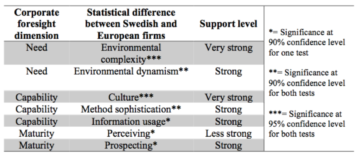 The four main findings
The four main findings
- Swedish firms act in a less dynamic environment than their European counterparts.
- Swedish firms’ environment is more complex.
- Swedish firms have stronger internal capabilities with regards to culture, method sophistication and information usage.
- Swedish firms have stronger perceiving (foresight scanning) abilities but weaker prospecting (analyzing the perceived trends) abilities than European firms.
Corporate foresight
Corporate foresight is a term closely related to long-term strategies. In short, it can be described as an ability that enables companies to detect early discontinuous change, and act appropriately to these changes. A concrete example of a company good at detecting these discontinuous changes and acting appropriately is the Finnish company Nokia. Founded in 1865 as a paper mill company, the company later moved into rubber tire and boots production onward to become the telecommunications company it is today Interestingly, Nokia can also be viewed as a company slow to detect and act upon important trends in one aspect. During the rapid progression of smartphones, Nokia was too late to adapt to this change resulting in a massive revenue decrease from which the company has not yet recovered.
Persheng Babaheidari and Hans De Geer, former KTH students from the Industrial Engineering and Management program (Civ.ing. industriell ekonomi) has written a master thesis on the subject of differences between Swedish and European firms when it comes to corporate foresight.
Previous research done in the field of corporate foresight has focused on different ways of measuring foresight, and determine what separates great attributes from less good ones. In our thesis we focused on Professor Rene Rohrbeck’s approach on measuring corporate foresight in three dimensions – need, capabilities and maturity of corporate foresight. In short, the needs focus on how much foresight is needed for a certain firm in a certain industry, the capabilities focus on the underlying foundations for successful foresight, such as company culture, organization and method sophistication. The maturity of corporate foresight is the actual use of foresight, how well a company scans for information, how this information is analyzed and how it is acted upon.

The maturity model (Rohrbeck Heger GmbH)
The difference between the levels of corporate foresight between Swedish and European firms
Sweden today is often classed as one of the more innovative countries on earth, and combined with an increasingly global and disruptive economy, Swedish companies are facing a business environment increasingly filled with discontinuous change. As such, we wanted to find out if Swedish companies worked differently with their long-term strategies in order to stay competitive than their European counterparts. In short, we wanted to examine the difference between the levels of corporate foresight between Swedish and European firms. We made the decision to primarily focus on larger Swedish companies due to previous research focusing primarily on these types of companies, and due to the importance of these firms to the general economy.
Through our collaboration with the German foresight consultancy firm Rohrbeck Heger GmbH, we were allowed access to their database with extensive data on European firms’ levels of corporate foresight. We interviewed 11 large Swedish companies at the highest possible strategical level to get a good overview of these companies’ strategic initiatives. The interviews were done through a survey, as this enabled us to obtain directly comparable results with the existing database.
The results
By quantifying the survey results, and using a mathematical approach, we analyzed differences in the levels of corporate foresight maturity and capabilities. We used two statistical tests, one non-parametric test (Mann-Whitney U-test) and one parametric test (Welch’s t-test), and we found several interesting differences. For need, we found that Swedish firms act in a less dynamic environment than their European counterparts, but that Swedish firms’ environment is more complex. For capabilities, Swedish firms have stronger internal capabilities with regards to culture, method sophistication and information usage. Finally, for maturity, Swedish firms have stronger perceiving (foresight scanning) abilities but weaker prospecting (analyzing the perceived trends) abilities than European firms. In summary, it is not possible to say that the overall need or maturity with regards to corporate foresight is greater or more advanced for Swedish firms. However, a conclusion is that Swedish firms have stronger capabilities for corporate foresight than their European counterparts.

You can read the full thesis MasterThesis_KTH_PB_HDG_Final.
Do you want to develop your tools to work and prepare your business for the future? Read more about our course Digital Transformation.

